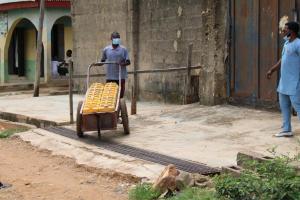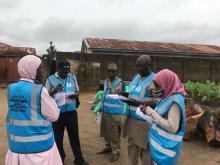Niger state strengthens sanitation systems against open defecation
Minna, 29 September, 2021 - On the frontline of ensuring that communities in Niger State stop open defecation, dispose of faecal sludge properly and embrace decent sanitation systems is 29-year-old Abubakar Mohammed, a community youth sanitation volunteer.
Mr Mohammed is one of the volunteers trained by the Niger State government to raise awareness among the residents on the importance of good hygiene, sanitation, and proper disposal of faecal sludge waste to prevent waterborne diseases such as cholera.
“I have been visiting households in Tudun Wada North to educate them on the importance of good sanitation. I raise awareness against open defecation, the need for proper excreta disposal and conscious management of sewage. I teach them how to wash their hands with water and soap and the importance of boiling or purifying water before use.
“I have been doing my bit within the community, and I am glad the government is also using the media to call for a behavioral change. I heard the sensitization talk given by the state sanitation team and the WHO official on the radio. I believe it will help change people’s behavior and contain the spread of diseases”, he said.
The fight against cholera
The campaign for behavioural change is apt, as the state is currently battling an outbreak of cholera amidst the ongoing covid-19 pandemic. As of 05 September 2021, 25 states and the Federal Capital Territory have reported 69 925 suspected cases with 2 323 deaths from the disease. In Niger State, 2 265 cases have been reported and 142 deaths within the same period.
To mitigate the health hazards, the World Health Organization (WHO) initiated a project supporting the Niger State government to implement a State Sanitation Safety Planning (SSP) to ensure the proper control of faecal sludge and grey wastewater through a risk management approach.
Also, sensitization campaigns on sanitation safety are carried out across the state by youth volunteers and the SSP Joint Campaign team using radio and television programmes. The sensitization has been aired on Niger State Television, Nigeria Television Authority, Niger state station and Niger State radio.
Open defecation and poor sanitation and hygiene practices compromise children's health and development. The children born into vulnerable families practicing open defecation are at risk of dying of cholera, diarrhoea, typhoid and dysentery.
Isah Alilu, a water vendor and father of six children residing in Tudun Wada North said he realized the importance of good water and food, hand hygiene and the disadvantages of open defecation after one of his children contracted cholera.
“My five-year-old son, Musa, was hospitalized last month due to cholera. He was stooling and vomiting and got weak within three hours. We had to rush him to the hospital for treatment. After my son fell ill, I realized the importance of the sanitation awareness Mr Mohammed had been doing within the community.
“I did not know that cholera is transmitted through improper disposal of excreta or contaminated water source. I have since been careful of where I purchase water my family use and that I sell. I now know that it is harmful to situate a borehole beside sewages”, he said.
Meanwhile, Hajara Mohammed, a full-time housewife and mother of four said she has been extra careful with taking care of her family since she heard of the cholera outbreak in the state.
I heard that there is a cholera outbreak in Niger state. I have been cautious of the source of water supply used in the house since I heard sensitization on the radio and a health educator came to my house to educate me on how to protect my family. Although my family lives in a house with a toilet, we, however, buy water.
After the sensitization team came to my house, I started using water purifiers to purify the water before use because there are times the water has particles, and one cannot be sure of the source, she said.
Sustaining multisectoral one- health approach
Commending WHO for the support, the Niger State Permanent Secretary, Ministry of Water Resources and Dams Management, Alhaji Abubakar Sadiq Idris, said the programme is timely, considering the various outbreaks in the state.
He said WHO has been working closely with the state government to achieve healthy cities by providing technical expertise to the stat’s ministries of health, environment water resources and agriculture, under the one health approach, to coordinate a strong practical understanding of the municipal water industry.
He noted that the Sanitation Safety Planning plan would assist the state implement and manage a sanitation service chain, including toilet containment/storage, conveyance, treatment and end-use or disposal.




